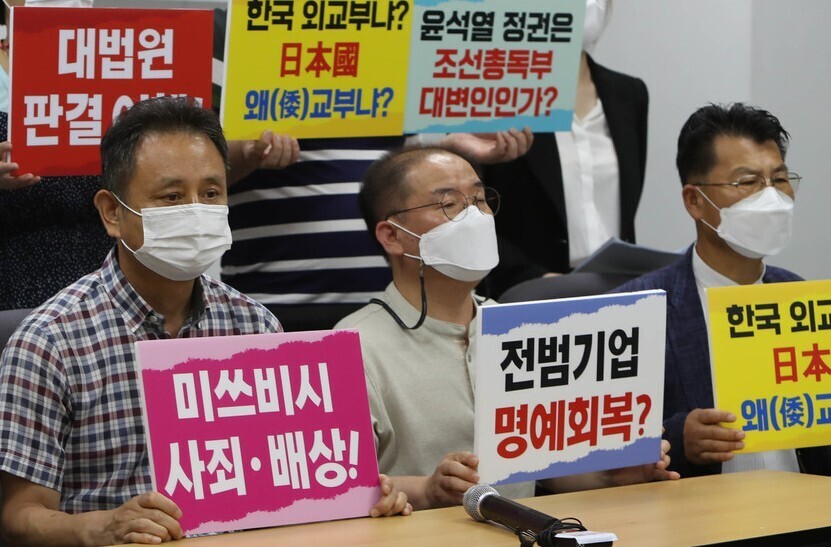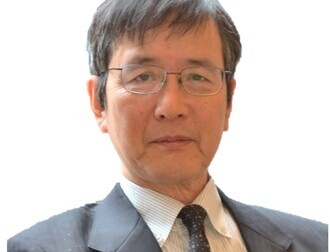hankyoreh
Links to other country sites 다른 나라 사이트 링크
[Interview] Fears of “breakdown” in Korea-Japan ties over forced labor case miss point, says postwar litigation specialist

“The argument that liquidating [the Korean assets of Japanese companies] would wreck Korea-Japan relations amounts to browbeating the victims into giving up their case,” said Seita Yamamoto, a 69-year-old Japanese attorney who has long represented victims in postwar damages litigation against the Japanese government. Yamamoto made the remarks during a series of emails exchanged with the Hankyoreh on July 26 and July 28.
After the South Korean Supreme Court ruled in Oct. 2018 that Japanese companies should compensate Koreans who had been conscripted for forced labor during Japan’s colonial rule over Korea, the decision aroused widespread criticism in the Japanese public. That prompted Yamamoto and his fellow attorneys to publish a book (“It Wasn’t Complete, and It’s Not Over”) presenting a legal analysis of the legitimacy and historicity of the Korean Supreme Court’s decision. Yamamoto’s interview with the Hankyoreh is presented below.
Hankyoreh: What prompted your interest in the issue of postwar reparations?
Yamamoto: When I was a college student studying Japanese history, I participated in the support movement for Son Jin-du, a Korean atomic bomb victim who stowed away to Japan in order to receive treatment, in 1972. I also assisted Kim Jong-gap, a Korean Japanese individual who was a victim of forced labor, with his lawsuit for the verification of his Japanese nationality. It was much later that I realized that these trials were the beginning of postwar reparations trials. Afterward, I met Korean Japanese activist Song Du-hoe and took part in preparations for postwar reparations trials, such as that related to the Ukishima Maru incident, which Song had been carrying out since his days as a judicial trainee. It wasn’t that there was a particular reason, but that someone who didn’t even know the phrase “postwar reparations” somehow got in the middle of it.
Hani: As an expert on postwar reparations, how do you view the Supreme Court of Korea’s October 2018 verdict that ordered victims of forced labor to be compensated?Yamamoto: I see the Supreme Court of Korea’s majority opinion that reparations regarding illegal activities were not included in the Treaty on Basic Relations as a “traditional judgment.” As someone who has debated the Japanese government in trials, I find the court’s minority opinion that South Korea simply relinquished its right to diplomatic protection through the Treaty on Basic Relations and that individuals’ right to claim damages was not nullified familiar as well. The Japanese court’s judgment that “everything,” including victims’ right to claim damages, was resolved through the Treaty of San Francisco, the China-Japan joint statement, and the Treaty on Basic Relations, and that this is why victims cannot claim damages in court, is the unusual one and an interpretation that goes against international law.
Hani: The Japanese government is even blocking contact between victims and offending companies that would facilitate the implementation of the Supreme Court’s verdict. On the other hand, when it came to Chinese victims of forced labor, the Japanese government looked the other way when offending companies apologized and participated in compensation. What are your thoughts on this?Yamamoto: The reason the Japanese government overlooked reconciliation between Chinese victims and offending companies was probably economic. This is a clear double standard.
Hani: The final verdict regarding the sale and liquidation of assets held by offending companies in Korea in accordance with the Supreme Court’s ruling is upcoming. The Japanese and South Korean governments are claiming that liquidation would mean the breakdown of South Korea-Japan relations. What would be a desirable solution?Yamamoto: The argument that liquidation would break down ties between South Korea and Japan has surfaced in Japan, in Korea, and from within each country’s civil society, but I don’t understand what it means. What does “breakdown” mean here? Would it be like the situation between Russia and Ukraine? Does anyone really believe that if the liquidation of assets held by offending companies in Korea takes place, the Japanese Self-Defense Forces would land on Dokdo or carry out a missile attack against Seoul?
Inversely, the present situation in which the South Korean ambassador to Japan cannot even meet with the Japanese prime minister already indicates a breakdown, considering what’s usual between friendly nations. An argument that brings up the possibility of a “breakdown” over and over threatens the victims, insinuating that going further would lead them to trouble and coaxing them to give up.
A solution that begins with the idea that the South Korean government should “avoid a breakdown” when both the Japanese government and offending companies are refusing to apologize is bound to fail. If the Japanese side has no intention of apologizing, and the South Korean government does not intend to resolve the issue by centering victims as a principle, it seems like the implementation of the legal procedure, liquidation, would be inevitable.
By Jung In-hwan, staff reporter
Please direct questions or comments to [english@hani.co.kr]

Editorial・opinion
![[Column] Has Korea, too, crossed the Rubicon on China? [Column] Has Korea, too, crossed the Rubicon on China?](https://flexible.img.hani.co.kr/flexible/normal/500/300/imgdb/original/2024/0419/9317135153409185.jpg) [Column] Has Korea, too, crossed the Rubicon on China?
[Column] Has Korea, too, crossed the Rubicon on China?![[Correspondent’s column] In Japan’s alliance with US, echoes of its past alliances with UK [Correspondent’s column] In Japan’s alliance with US, echoes of its past alliances with UK](https://flexible.img.hani.co.kr/flexible/normal/500/300/imgdb/original/2024/0419/2317135166563519.jpg) [Correspondent’s column] In Japan’s alliance with US, echoes of its past alliances with UK
[Correspondent’s column] In Japan’s alliance with US, echoes of its past alliances with UK- [Editorial] Does Yoon think the Korean public is wrong?
- [Editorial] As it bolsters its alliance with US, Japan must be accountable for past
- [Guest essay] Amending the Constitution is Yoon’s key to leaving office in public’s good graces
- [Editorial] 10 years on, lessons of Sewol tragedy must never be forgotten
- [Column] A death blow to Korea’s prosecutor politics
- [Correspondent’s column] The US and the end of Japanese pacifism
- [Guest essay] How Korea turned its trainee doctors into monsters
- [Guest essay] As someone who helped forge Seoul-Moscow ties, their status today troubles me
Most viewed articles
- 1[Column] The clock is ticking for Korea’s first lady
- 2Hong Se-hwa, voice for tolerance whose memoir of exile touched a chord, dies at 76
- 3After 2 months of delayed, denied medical care, Koreans worry worst may be yet to come
- 4[Column] Has Korea, too, crossed the Rubicon on China?
- 5[Correspondent’s column] In Japan’s alliance with US, echoes of its past alliances with UK
- 6US overtakes China as Korea’s top export market, prompting trade sanction jitters
- 7Samsung barricades office as unionized workers strike for better conditions
- 8All eyes on Xiaomi after it pulls off EV that Apple couldn’t
- 9More South Koreans, particularly the young, are leaving their religions
- 10John Linton, descendant of US missionaries and naturalized Korean citizen, to lead PPP’s reform effo